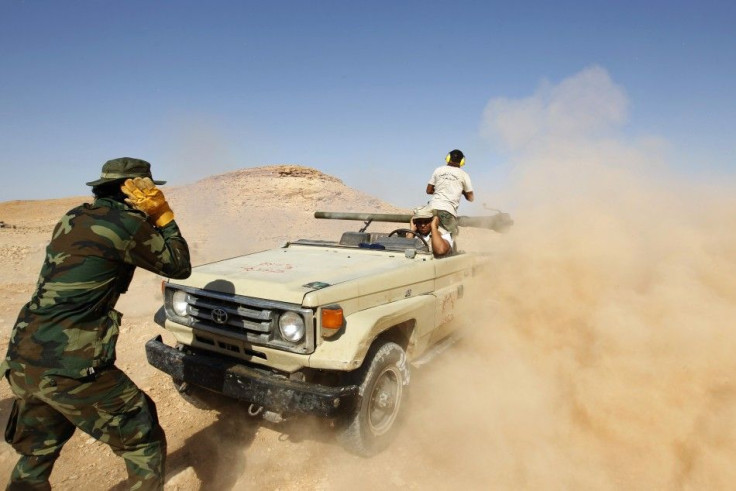Libyan Rebels Turned Back Again, Fail to Name Cabinet

Libya's interim leaders failed to agree a new Cabinet Sunday and the forces that forced Moammar Gadhafi from power remained bogged down in fighting with troops loyal to the former ruler.
Interim government forces fled in chaos from the town of Bani Walid and pulled back from Sirte after yet more failed attempts to storm Gadhafi's final bastions and take control of the entire country.
The political and military problems underscored how hard it would be to restore stability to Libya after Gadhafi was driven out of Tripoli last month.
The former rebels' executive committee, or Cabinet, was dissolved last month. A new committee, to include officials responsible for defense and interior affairs, was supposed to be appointed by interim Prime Minister Mahmoud Jibril on Sunday.
But the talks broke down when his proposals did not receive full backing from all current members.
We had an advisory meeting with the NTC in order to form a new Cabinet. We have agreed on a number of portfolios. We still have more portfolios to be discussed, Jibril told reporters through a translator at a news conference Sunday.
A list of the approved ministries was not available, though sources familiar with the negotiations said that the position of Jibril himself was a sticking point during the talks.
There was also disagreement about whether it is necessary to form a transitional government before the declaration of liberation - a concept that appears to include the capture of Gadhafi and the defeat of his loyalists who still hold three key towns.
The NTC has drawn up a road map setting out plans for a new constitution and elections over a 20-month period, which should start once that declaration is made.
With political negotiations bogged down, Sunday's failed attempt to take Bani Walid set off angry recriminations among the attackers, who must capture the town and Gadhafi's birthplace Sirte before they can declare Libya liberated.
RECRIMINATIONS
Since taking Tripoli last month, National Transitional Council fighters have tried several times to storm Bani Walid, 150 km (90 miles) southeast of the capital, only to retreat under heavy fire and in disorder.
NTC fighters said they had planned for tanks and pickup trucks with anti-aircraft guns and rocket launchers to lead Sunday's attack, but foot soldiers had piled in first.
There is a lack of organization so far. Infantry men are running in all directions, said Zakaria Tuham, a senior fighter with a Tripoli-based unit.
Our commanders had been told that heavy artillery units had already gone ahead, but when we advanced into Bani Walid they were nowhere to be seen.
Gadhafi forces were hitting us heavily with rockets and mortars, so we have pulled out.
A Reuters reporter saw fighters withdraw around two km (more than a mile) after they had stormed into the town.
NATO planes circled above the town later on Sunday and loud explosions were heard from the center, though it was not clear whether the planes had attacked.
Anti-Gadhafi fighters from Bani Walid blamed comrades from elsewhere in Libya for being unwilling to coordinate. Those from elsewhere accused some local fighters of being traitors and passing information to Gadhafi loyalists.
Commanders who are from the Warfalla tribe, they tell us one thing and then commanders from the other cities say something else. We do not understand anything, said pro-NTC fighter Mohamed Saleh.
Some fighters openly disobeyed orders. In one incident, an officer from Bani Walid was heckled by troops from Tripoli after he tried to order them to stop randomly shooting in the air as they celebrated seizing a mortar from Gadhafi forces.
You are not my boss. Don't tell me what to do, one of the Tripoli fighters snapped back at him.
Shells whistled above anti-Gadhafi positions and exploded across the desert valley as invisible snipers sprayed bullets from Bani Walid's rooftops and smoke rose above the town.
NTC fighters helped some families leave the town, driving them out in military trucks.
The past two weeks have been awful, but last night was particularly bad, said Zamzam al-Taher, a 38-year-old mother of four. We have been trapped here without a car and with no food. Snipers are everywhere.
BATTLE FOR SIRTE
NTC forces and NATO warplanes also attacked Sirte, Gadhafi's birthplace. Fighters launched rockets from the city's southern entrance and traded fire with Gadhafi loyalists holed up in a conference center.
The situation is very dangerous. There are so many snipers and all the types of weapons you can imagine, said fighter Mohamed Abdullah as rockets whooshed through the air and black smoke rose above the city.
As in many episodes during Libya's conflict, the front lines at Sirte and Bani Walid have moved back and forth, with shows of bravado crumbling in the reality of battle.
An incoming shell landed within 200 meters of NTC-held lines, only to be met with return fire from NTC fighters shouting Allahu Akbar! (God is greatest).
Speaking against the roar of NATO jets overhead, one anti-Gadhafi fighter at Sirte, Mahmoud Othman, said his men were helping families who had fled ahead of the next assault.
We don't want any hmore bloodshed between us. But if the Gadhafa want more blood, we are ready, he said, referring to the deposed leader's tribe. In the end we want Gadhafi.
A spokesman for Gadhafi told Syrian-based Arrai TV on Sunday that 17 mercenaries, including what he called French and British technical experts, had been captured in Bani Walid.
It was not immediately possible to verify the report. NATO, French and British officials had on Saturday denied a report by Arrai TV that NATO troops had been captured by Gadhafi loyalists.
(Additional reporting by William MacLean and Joseph Logan in Tripoli, Sherine El Madany in Herawa, Alexander Dziadosz in Benghazi, Barry Malone and Sylvia Westall in Tunis; Editing by Myra MacDonald)
© Copyright Thomson Reuters 2024. All rights reserved.





















